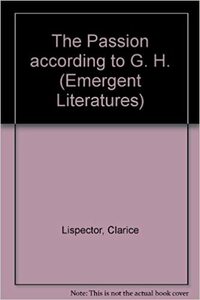Take a photo of a barcode or cover
the book that changed everything and I can never read again for that reason
I just don't get it. There's some lines I enjoyed but seriously WTF is she on about? Reads like post-modern word salad. The writing style reminded of "The Longcut," and I don't know if I'm just not in the mood to read another book in this style so soon, or if Lispector is just completely impenetrable to me. 73 pages in and I still haven't grasped what she's trying to convey in her gobbledygook of purple prose meanderings on life. At least "The Longcut" had a purpose to the writing style that added to the theme of the story. I just can't make this one out. Something about how we're all just cockroaches nearing death? or something.
emotional
reflective
medium-paced
challenging
dark
emotional
mysterious
reflective
tense
slow-paced
Plot or Character Driven:
Character
Strong character development:
Complicated
Loveable characters:
N/A
Diverse cast of characters:
No
Flaws of characters a main focus:
Yes
challenging
dark
mysterious
reflective
medium-paced
emotional
fast-paced
challenging
mysterious
slow-paced
Plot or Character Driven:
N/A
Strong character development:
N/A
Loveable characters:
N/A
Diverse cast of characters:
N/A
Flaws of characters a main focus:
N/A
José Castello said of Lispector's work: "Be careful with Clarice, it's not literature, it's witchcraft". Her writing has this habit of taking over the reader like a spell, dilating space and time to fit the infinite and putting words to thoughts that had previously only been feelings.
Reading Clarice Lispector's work is almost a visceral experience. Like a literary Magic Eye puzzle, the words at face value are confusing and distorted but you eventually enter a hypnotic, trance-like state where the images she creates start to form in your mind. The novel takes place when the protagonist G.H. crushes a roach, but that almost does not matter. Over the course of the work, Lispector envelopes the reader in a fugue state where she examines reality, morality, identity, religion, and many other themes through a stream of consciousness journey to nowhere.
Truly a tough read, Lispector's wording is circular and dense but therein lies the reward; if you can unfocus your eyes in just the right way the images line up to form something magical.
(Also, as always, it is such a treat to read her work in the original Portuguese. She exhibits a prosody rivaled only in poetry, weaving not just words together, but sounds that only elevate the mesmerizing quality of her work)
Reading Clarice Lispector's work is almost a visceral experience. Like a literary Magic Eye puzzle, the words at face value are confusing and distorted but you eventually enter a hypnotic, trance-like state where the images she creates start to form in your mind. The novel takes place when the protagonist G.H. crushes a roach, but that almost does not matter. Over the course of the work, Lispector envelopes the reader in a fugue state where she examines reality, morality, identity, religion, and many other themes through a stream of consciousness journey to nowhere.
Truly a tough read, Lispector's wording is circular and dense but therein lies the reward; if you can unfocus your eyes in just the right way the images line up to form something magical.
(Also, as always, it is such a treat to read her work in the original Portuguese. She exhibits a prosody rivaled only in poetry, weaving not just words together, but sounds that only elevate the mesmerizing quality of her work)
challenging
emotional
reflective
slow-paced
Plot or Character Driven:
Character
Strong character development:
Yes
Loveable characters:
Yes
Diverse cast of characters:
No
Flaws of characters a main focus:
No
Lispector’s truly unique voice and approach to how she channels her philosophies through her characters’ reflections or actions never fails to impress me. The process of following all the shifting philosophical contemplations in this book wasn’t the easiest at times, but eventually very rewarding as by placing myself in the main character’s place and trying to keep up with her own tone and the speed of the changing interweaving thoughts put me in a trance alike the one she’s experiencing throughout the book. As the mc’s mental ‘metamorphosis’ concludes with her reflecting on her « extending beyond my own sensibility » , I come to realize that what made this reading experience special was precisely that the requirement for full understanding was forcing me to similarly leave my own mind and preconceptions about the definition or purpose of a novel, and reconstruct all of it alongside G. H.



